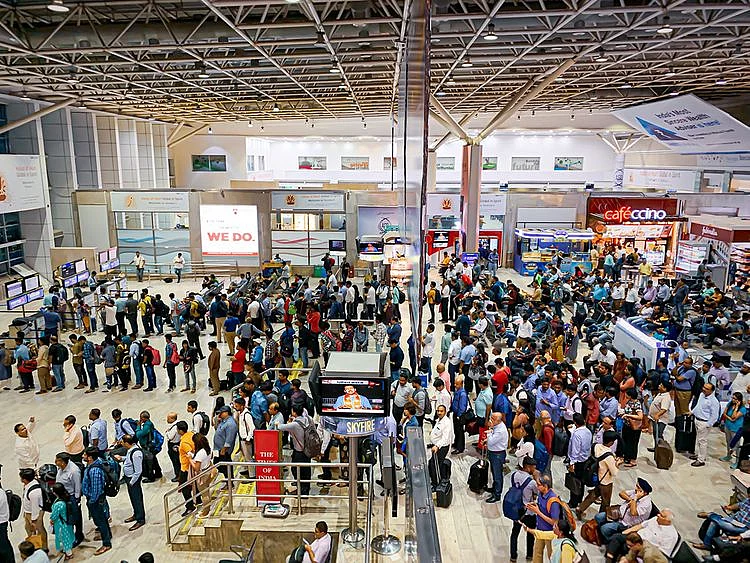India-UAE airfares skyrocket, agents seek more flights in peak season
Travel agents call for revision in agreements as India-UAE fares hit exorbitant highs

Dubai: Travel experts are calling for a re-examination of India–UAE air bilateral agreements after skyrocketing ticket prices ahead of the UAE National Day break and year-end holidays.
Travel agents say unprecedented demand, coupled with stagnant flight capacity, has pushed fares on India-bound routes to their highest in years.
“Every year, expatriates carefully plan their trips home for National Day and New Year holidays,” said Sudheesh of Deira Travels. “Travellers book two to three months in advance, yet the fares are still extremely high because airline supply has not grown along with demand.”
With most travellers flying out by November 28 and returning during the first week of January, experts warn that limited seat availability has a risk of becoming a recurring seasonal trend.
Currently, India and UAE have emirate-specific bilateral agreements with limits on weekly seat capacities: Dubai airlines (such as Emirates and flydubai) and Indian carriers each have about 65,000 weekly seats authorised. Similarly, that number has been stuck at 55,000 in Abu Dhabi.
Soaring fares, limited supply
Industry insiders point out that even as demand rises annually, airline capacity between India and the UAE has barely moved. “Demand is growing every season, but frequency increases are not happening because the bilateral capacity is already maxed out,” noted Sudheesh.
Airfares from Dubai to Mumbai have hit peaks for Dh1,500 and above, from its off-season lows of Dh800-Dh1,000. Fares on routes to Kerala and South India have surged sharply to highs of Dh2,107 and Dh1,945 from off-peak lows of Dh1,000 to Dh1,100.
Rashid Abbas, Managing Director of Arooha Travels, said, “Flights to Kerala are packed from November 28 onwards. Even off-season tickets cost between Dh350 and Dh400, but airlines rely on peak season to recoup annual losses.”
He added that many travellers are struggling to afford tickets home, with “some sectors now pricing far beyond what the average family can pay.”
Call for temporary flight increases
Agents say authorities should consider temporary frequency boosts during peak seasons to relieve pressure. “Even if bilaterals are unchanged, carriers could be allowed to operate additional flights for a limited period,” suggested Sudheesh. “That would make fares more reasonable and help both tourism and trade.”
Experts believe this would also address a widening market imbalance. Abbas said, “Unless national carriers have the aircraft and manpower to meet demand, let willing airlines step in. The aim is not competition, but connectivity.”
Airlines face supply bottlenecks
While private and national airlines such as Air India Express, IndiGo, and Etihad have expanded operations, industry capacity remains constrained by aircraft shortages and policy rigidity. Several Indian carriers are awaiting new aircraft deliveries, while approvals for capacity increases have not materialised.
Emirates chairman and chief executive Sheikh Ahmed bin Saeed Al Maktoum has said India’s long-standing restrictions on flight rights are holding back its own aviation and economic growth. He described the unchanged bilateral air travel limits between India and the United Arab Emirates as a missed opportunity for both sides.
“If an airline is not allowed new seats for close to 12 years, who will lose?” Sheikh Ahmed told reporters when asked about the stalemate during the Dubai Airshow. “We are happy to see India giving us more seats in the future. That will benefit both economies.”
Etihad Airways, which has expanded its India network this year and showcased its future plans at the Dubai Airshow, sees growing demand across South Asian corridors. Etihad Airways CEO Antonoaldo Neves has said that expanding market opportunities between India and the UAE could “support economic growth, tourism, and closer people-to-people ties.”
However, travel agents emphasise that such growth should translate into affordable mobility. “Without balancing demand and supply, families and workers will continue to feel the pinch,” said Abbas.
Travellers plan early but still pay more
Travel planners report that most group tours and family packages were booked months in advance, yet passengers are still paying premium rates. “Group tour packages were confirmed as early as six months ago,” said Sudheesh. “Even early birds can’t escape peak fares.”
With visa-free destinations limited and Indian expatriates preferring to travel home, agents predict similar strain for December 2025. “This pattern repeats every year,” Abbas added. “It’s time for policymakers to review this seasonally, at least for the India–UAE corridor.”
Sign up for the Daily Briefing
Get the latest news and updates straight to your inbox
Network Links
GN StoreDownload our app
© Al Nisr Publishing LLC 2026. All rights reserved.